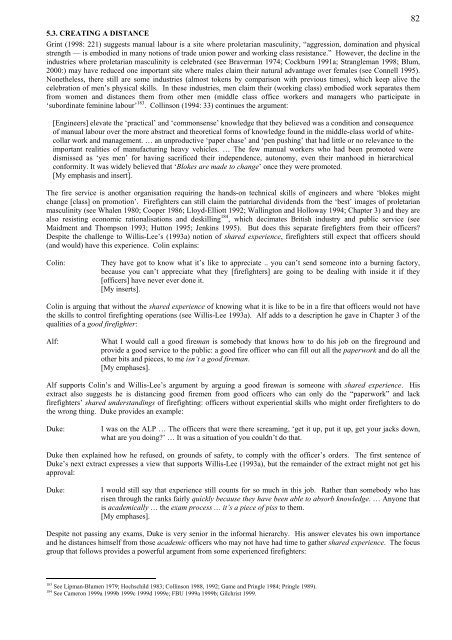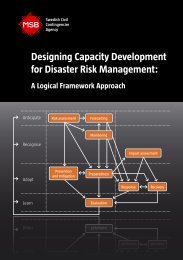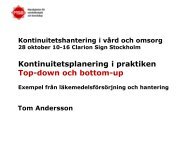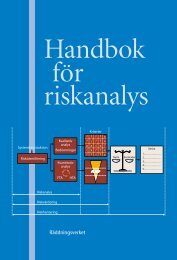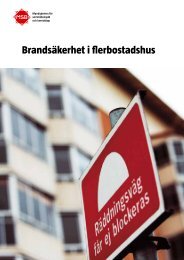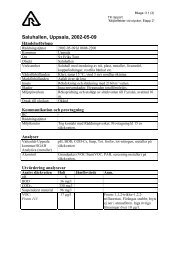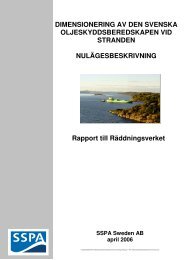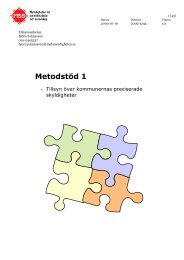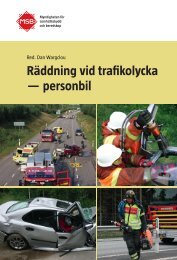One more last working class hero
One more last working class hero
One more last working class hero
You also want an ePaper? Increase the reach of your titles
YUMPU automatically turns print PDFs into web optimized ePapers that Google loves.
5.3. CREATING A DISTANCE<br />
Grint (1998: 221) suggests manual labour is a site where proletarian masculinity, “aggression, domination and physical<br />
strength — is embodied in many notions of trade union power and <strong>working</strong> <strong>class</strong> resistance.” However, the decline in the<br />
industries where proletarian masculinity is celebrated (see Braverman 1974; Cockburn 1991a; Strangleman 1998; Blum,<br />
2000:) may have reduced one important site where males claim their natural advantage over females (see Connell 1995).<br />
Nonetheless, there still are some industries (almost tokens by comparison with previous times), which keep alive the<br />
celebration of men’s physical skills. In these industries, men claim their (<strong>working</strong> <strong>class</strong>) embodied work separates them<br />
from women and distances them from other men (middle <strong>class</strong> office workers and managers who participate in<br />
‘subordinate feminine labour’ 183 . Collinson (1994: 33) continues the argument:<br />
[Engineers] elevate the ‘practical’ and ‘commonsense’ knowledge that they believed was a condition and consequence<br />
of manual labour over the <strong>more</strong> abstract and theoretical forms of knowledge found in the middle-<strong>class</strong> world of whitecollar<br />
work and management. … an unproductive ‘paper chase’ and ‘pen pushing’ that had little or no relevance to the<br />
important realities of manufacturing heavy vehicles. … The few manual workers who had been promoted were<br />
dismissed as ‘yes men’ for having sacrificed their independence, autonomy, even their manhood in hierarchical<br />
conformity. It was widely believed that ‘Blokes are made to change’ once they were promoted.<br />
[My emphasis and insert].<br />
The fire service is another organisation requiring the hands-on technical skills of engineers and where ‘blokes might<br />
change [<strong>class</strong>] on promotion’. Firefighters can still claim the patriarchal dividends from the ‘best’ images of proletarian<br />
masculinity (see Whalen 1980; Cooper 1986; Lloyd-Elliott 1992; Wallington and Holloway 1994; Chapter 3) and they are<br />
also resisting economic rationalisations and deskilling 184 , which decimates British industry and public service (see<br />
Maidment and Thompson 1993; Hutton 1995; Jenkins 1995). But does this separate firefighters from their officers?<br />
Despite the challenge to Willis-Lee’s (1993a) notion of shared experience, firefighters still expect that officers should<br />
(and would) have this experience. Colin explains:<br />
82<br />
Colin:<br />
They have got to know what it’s like to appreciate .. you can’t send someone into a burning factory,<br />
because you can’t appreciate what they [firefighters] are going to be dealing with inside it if they<br />
[officers] have never ever done it.<br />
[My inserts].<br />
Colin is arguing that without the shared experience of knowing what it is like to be in a fire that officers would not have<br />
the skills to control firefighting operations (see Willis-Lee 1993a). Alf adds to a description he gave in Chapter 3 of the<br />
qualities of a good firefighter:<br />
Alf:<br />
What I would call a good fireman is somebody that knows how to do his job on the fireground and<br />
provide a good service to the public: a good fire officer who can fill out all the paperwork and do all the<br />
other bits and pieces, to me isn’t a good fireman.<br />
[My emphases].<br />
Alf supports Colin’s and Willis-Lee’s argument by arguing a good fireman is someone with shared experience. His<br />
extract also suggests he is distancing good firemen from good officers who can only do the “paperwork” and lack<br />
firefighters’ shared understandings of firefighting: officers without experiential skills who might order firefighters to do<br />
the wrong thing. Duke provides an example:<br />
Duke:<br />
I was on the ALP … The officers that were there screaming, ‘get it up, put it up, get your jacks down,<br />
what are you doing?’ … It was a situation of you couldn’t do that.<br />
Duke then explained how he refused, on grounds of safety, to comply with the officer’s orders. The first sentence of<br />
Duke’s next extract expresses a view that supports Willis-Lee (1993a), but the remainder of the extract might not get his<br />
approval:<br />
Duke:<br />
I would still say that experience still counts for so much in this job. Rather than somebody who has<br />
risen through the ranks fairly quickly because they have been able to absorb knowledge. … Anyone that<br />
is academically … the exam process … it’s a piece of piss to them.<br />
[My emphases].<br />
Despite not passing any exams, Duke is very senior in the informal hierarchy. His answer elevates his own importance<br />
and he distances himself from those academic officers who may not have had time to gather shared experience. The focus<br />
group that follows provides a powerful argument from some experienced firefighters:<br />
183 See Lipman-Blumen 1979; Hochschild 1983; Collinson 1988, 1992; Game and Pringle 1984; Pringle 1989).<br />
184 See Cameron 1999a 1999b 1999c 1999d 1999e; FBU 1999a 1999b; Gilchrist 1999.


